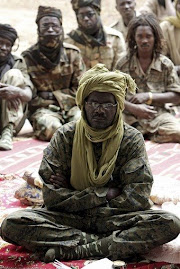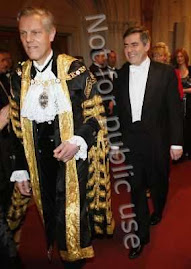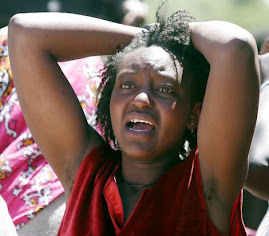The country (the Sudan) has just concluded celebrating the 3rd anniversary of the Comprehensive Peace Agreement (CPA), on January 9th, 2008. This year's CPA celebrations – though marked officially throughout the country's State capitals – were officially celebrated in Khartoum, the national capital, and Wau, the capital of Western Bahr Al Ghazal State.
Most of the English daily newspapers in Sudan have been publishing congratulatory messages to the First Vice-President and President of the Government of South Sudan (GoSS), Lt-Gen. Salva Kiir Mayardit, on the occasion. Khartoum Monitor, The Citizen and Sudan Tribune newspapers published congratulatory messages from a variety of organisations, including investors that could sincerely be seen as congratulating Lt-Gen. Kiir and, upto a certain extent, the Sudanese public for the achievement of the CPA.
One of these congratulatory messages said: "Congratulation to the President of GoSS and the people of Sudan for the 3rd commemoration of the signing of the CPA", (January 12th, 2008). Another message said: "Congratulations to 1st Vice-President of the Republic of Sudan and the President of South Sudan(,) H.E. Lt-Gen. Salva Kiir Mayardit, the entire cabinet, State Governments and the people of South Sudan for efforts exerted to bring about a realistic peace in South Sudan", (January 15th, 2008).
Some of the readers would beg to disagree with this author and say he is trying to make a 'dome out of a spot' (an Arabic idiom: "beyes'aa an yakhliq min 'al habbah gubbah।'" This may be true in the sense that thinks like congratulatory messages are ignored by many readers. They are regarded by some readers as a waste of their reading time.
Most of the English daily newspapers in Sudan have been publishing congratulatory messages to the First Vice-President and President of the Government of South Sudan (GoSS), Lt-Gen. Salva Kiir Mayardit, on the occasion. Khartoum Monitor, The Citizen and Sudan Tribune newspapers published congratulatory messages from a variety of organisations, including investors that could sincerely be seen as congratulating Lt-Gen. Kiir and, upto a certain extent, the Sudanese public for the achievement of the CPA.
One of these congratulatory messages said: "Congratulation to the President of GoSS and the people of Sudan for the 3rd commemoration of the signing of the CPA", (January 12th, 2008). Another message said: "Congratulations to 1st Vice-President of the Republic of Sudan and the President of South Sudan(,) H.E. Lt-Gen. Salva Kiir Mayardit, the entire cabinet, State Governments and the people of South Sudan for efforts exerted to bring about a realistic peace in South Sudan", (January 15th, 2008).
Some of the readers would beg to disagree with this author and say he is trying to make a 'dome out of a spot' (an Arabic idiom: "beyes'aa an yakhliq min 'al habbah gubbah।'" This may be true in the sense that thinks like congratulatory messages are ignored by many readers. They are regarded by some readers as a waste of their reading time.
However, conflict resolution and management does take minute details like this into consideration। It normally advises for consideration of statements before they are made and respecting each other's values in those statements for mutual respect to thrive. This generates 'respect of each other's official positions in trying to resolve a conflict.'
"Values are beliefs or principles we consider to be very important. Serious conflicts arise when people hold incompatible values or when values are not clear. Conflicts also arise when one party refuses to accept the fact that the other party holds something as a value rather than a preference", (http://www2.ctic.purdue.edu/KYW/Brochures/ManageConflict.html).
Some statements do breed mistrust in communities and in our case, partnerships. Congratulatory messages are official statements made by important members of the public; be they in government, civil society organisations, multi-national national investment companies, the public and private sectors, political organisations and individuals within the community. Statements like the two quoted from the daily newspapers are considered by conflict managers as structural conflicts in the making.
Observing the two quotes, however, one would realise that the President of the Republic and his 2nd Deputy are not congratulated for this important CPA achievement. This would obviously raise more questions than answers; because the CPA came into existence through the efforts of both the Sudan People's Liberation Movement (SPLM/A) and the National Congress Party (NCP) and the Sudan Armed Forces (SAF). SPLM/A cannot claim victory over the achievement of the CPA in the absence of its partner, the NCP, with whom it negotiated and signed the Naivasha agreement.
Viewing such incomplete public messages from the conflict resolution and management point of view, there is inconsistence with the laid down rules or procedures that guide the process of conflict resolution and management. In conflict management and resolution, once a conflict is identified, an appropriate method of resolution is sought out from those laid down for practice. In the case of Sudan, the conflict was identified long ago, an appropriate method(s) chosen and an agreement now known as the CPA was already negotiated and signed. Any signed agreement, thus, has its own unique basis for management.
Managing an already settled conflict is different from managing an on-going conflict. In management an on-going conflict, there are five steps. These steps are: Analyze the conflict; Determine management strategy; Pre-negotiation; Negotiation; Post-negotiation", (http://www2.ctic.purdue.edu/KYW/Brochures/ManageConflict.html).
But managing an already settled conflict as in Sudan's CPA, there are a number of CPA organs developed, including the Government of National Unity (GoNU), GoSS and State Governments. These include commissions and institutions and they are all charged with the duty of protecting and implementing the CPA. Protection and implementation of the CPA is the management of the settled conflict in the Sudan. The CPA dominates the country's Interim National Constitution (INC) and the INC empowers the governments to establish law and order, including Special Forces in the country now known as the Joint Integrated Units (JIUs).
The duty of these forces is to defend and respond to any threats – internal or otherwise – against the people of the Sudan, GoNU and the CPA. The law enforcements agencies which are supposed to be developed by the governments are supposed to maintain law and order and report any local and/or national violations to the CPA. This is management of the settled conflict in the Sudan.
These violations to the CPA could come from any of the partners: SPLM/A or NCP, depending on who decides to take the first move to do so. The supporters of both parties, too, could send serious messages across the public aimed at bringing about mistrust between the partners to the CPA. If they did, like it was witnessed by the Sudanese public when the SPLM/A withdrew from the GoNU, the partners had to resort to dialogue as one of the method(s) they chose before the negotiations. "Former southern rebels from the Sudan People's Liberation Movement on Thursday suspended their participation in the national government because of Khartoum's failure to implement a peace deal. 'Our participation in the government is frozen until we can find a solution to our differences with the north', adds a Senior SPLM/A official in Khartoum who refused to be mentioned by AFP, (http://www.sudan.net/news/posted/15385.html).
However, the most important aspect of the CPA in the Sudan is that it sustains itself and overcomes all kinds of stubbornness and such would be – as it were already said – 'an agreement to emulate.' This did not come out of nothing but through very serious and genuine efforts made by the conflict resolution and management experts and capable mediators like the East and Horn of Africa Inter-governmental Authority on Development (IGAD) and its friends.
Conflict Management mechanisms should have been reactivated by the partners to identify the reasons for SPLM/A withdrawal from GoNU and reasons for NCP's failure to implement the CPA? This could be managed by forming a committee or committees from both parties to investigate the allegations and those found guilty must be brought to book, made to apologise and forgiveness adopted by the leadership of both parties for the CPA to move ahead. One hopes that forgiveness, the basis for reconciliation, must have been exercised by the CPA partners to overcome their differences that cracked deep into their relationship.
Assuming that forgiveness was indeed exercised during the resolution of the conflict between the CPA partners, one question is important: why on earth should anyone, head of an organisation or private investor in his/her normal brains try to discredit Al Bashir as the President of the Sudan from the success of the very agreement when he gave orders to his Deputy at the time to reach an agreement with the SPLM/A rebels?
With the CPA there is no First Vice-President without the President. Those who are encouraging the existence of the First Vice-President and President of GoSS in the absence of the President or SPLM/A in the absence of NCP are doing this deliberately and this deliberate act of trying to disassociate or discredit the President of the Republic and his 2nd Deputy from the CPA success could develop into another constitutional problems: another tension unnecessarily created by what could be understood as 'disrespect to the partnership' that could likely lead towards another constitutional disaster.
The chiefs of those organisations and private investors whether based in the South or in the North and are bent on widening rather than narrowing the gap of mistrust between the CPA partners should live up to the responsibility of considering themselves as partners in the CPA implementation. They should use statements that promote good relations between the CPA partners. This is a duty call, which all the Sudanese people must accept if the CPA is to be fully implemented.
It was made clear by the architects of the CPA: Dr Garang de Mabior and Ali Osman Muhammad Taha that the CPA has become a property of the Sudanese people. "I would like to offer my congratulations, not only to the good General, but especially to Vice-President Taha and Dr Garang for their determination, their patience, their dedication to making sure that there was a successful outcome to this negotiation", Colin L. Powell, US Foreign Secretary, Inter-continental Hotel, Nairobi, Kenya, January 8th, 2005", one day before the celebrations marking the signing of the CPA. (http://www.state.gov/secretary/former/powell/remarks/2005/40461.htm).
Indeed, the CPA has become part and parcel of the country's INC. Having become the property of the Sudanese people, the CPA cannot be implemented by the partners alone. Instead it is the CPA partners' duty to provide guidance and resources for CPA implementation by the Sudanese people, the Church, civil society organisations and certainly the press.
It is not long ago since this country passed through one of its difficult constitutional crisis: the withdrawal of the SPLM/A from GoNU. This crisis has come to an end after the CPA partners sat down and ironed out their differences. This thus means that the resolution of the crisis had addressed the problems that caused the differences in the first place. This also means that the partnership is now in a position to learn from its past mistakes and do all that it has within its power to discourage those Sudanese who are bent on disappointing the NCP as a partner with the aim of discrediting it from within what it is already a player: the CPA.
Those who really want to congratulate H.E. Kiir on the achievement of the CPA and intend to discredit Al Bashir or his 2nd Deputy, Taha, should know that the positions that are being enjoyed by H.E. Kiir, that of the First Vice-President and President of GoSS are products of the CPA. In other words, the positions came as a result of the CPA, except that of SPLM Chairman and SPLA C-in-C.
Thus, those who want to discredit Al Bashir and Taha from the CPA may do so but without mentioning the entire Sudan as a country, First Vice-President and President of the South. That is to say, President, First Vice-President and President of GoSS and the Vice-President positions form the presidency that runs the Sudan as a country. They should use other titles of H.E. Kiir like Chairman and C-in-C of the SPLM/A. But trying to use positions created by the CPA, a document which was produced by two parties while totally disregarding and ignoring the other party, is nothing more than chaos. Disrespect to the CPA and INC is chaotic and should be avoided always. If not, it could reignite the fires of mistrust that the partners are trying day and night to put off.
















No comments:
Post a Comment